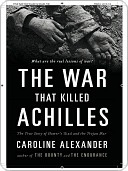More on this book
Community
Kindle Notes & Highlights
Read between
April 30 - June 14, 2019
Thus the dramatic events that define the Iliad are the denouncement by the great Achaean warrior Achilles of his commander in chief as a mercenary, unprincipled coward; the withdrawal of Achilles from the war; and the declaration by Achilles that no war or prize of war is worth the value of his life. Homer’s Iliad concludes not with a martial triumph but with Achilles’ heartbroken acceptance that he will in fact lose his life in this wholly pointless campaign.
Helen’s name, for example, can be traced to the Indo-European *Swelénā, from the root *swel—“sun,” “solar glare,” “burn,” “grill.” Her prototype was a Daughter of the Sun, the abduction of the Sun Maiden being a recurrent motif in old Indo-European myth.
To-ro-ja—Women of Troy.7 How women of Troy ended up as the inventory of a Mycenaean palace cannot be known from one slender entry, but the most straightforward explanation is that, like the women of Cnidus and Miletus—and Lemnos and Chios and other named settlements in Anatolia or the Aegean islands—they were, in the language of the tablets, “women taken as booty,” or captives, carried off to serve as “sewing women,” textile workers, “bath pourers,” and probably in their masters’ beds.
Troy was never more than a local power. The
a long-established textile industry,
Mēnis, then, is a charged word, more solemn and potent than its more mundane counterparts, chólos, or kótos—“anger,” “rancor.”21 Mēnis “is a dangerous notion, which one must fear; a sacral, ‘numinous’ notion.”22 In the Iliad, it is used only of gods and of Achilles. Like Demeter, Achilles makes his wrath felt by the withdrawal of his considerable abilities. “Wrath, sing goddess, of Peleus’ son Achilles, / and its devastation.” The devastation comes not from what he does do but from what he does not.
‘Even in the house of Hades there is left something, / a soul and an image, but there is no real heart of life in it.’ ”
Such games were evoked in the Iliad very recently: when Hektor ran from Achilles, it was not for the “prizes in the races of men—/ but they ran for the life of Hektor.”
This, the only occasion in the Iliad when furious Achilles smiles, serves as a bittersweet reminder of the difference real leadership could have made to the events of the Iliad.
even begun: “ . . . we know how much you surpass all others, by how much you are greatest for strength among the spear throwers, therefore take this prize and keep it and go back to your hollow ships; but let us give the spear to the hero Meriones; if your own heart would have it this way, for so I invite you.” Coolly forestalling the possibility that the son of Atreus might lose the competition and instigate yet another face-saving quarrel, Achilles tactfully intervenes. “He spoke, nor did Agamemnon lord of men disobey him.” A masterpiece of diplomacy, Achilles’ short speech reveals the great
...more


